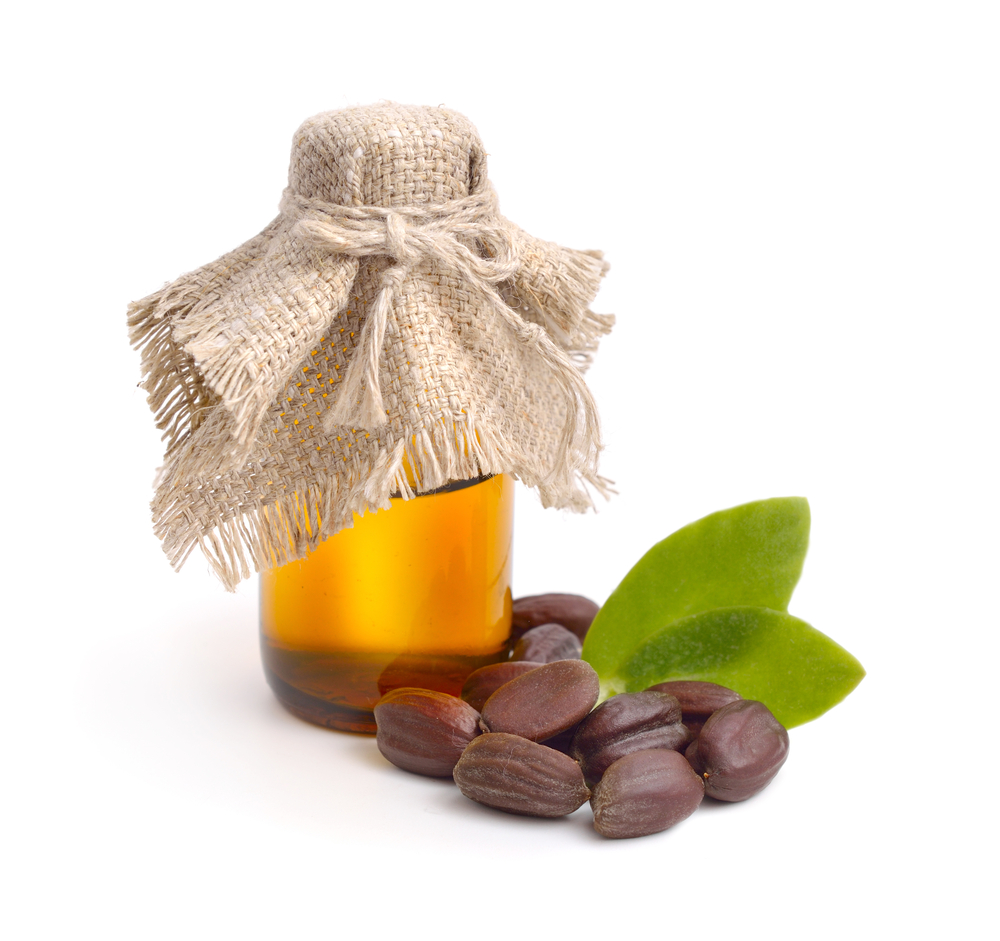We all know that collagen is an anti-aging compound that our own body makes. There are ways to increase levels after they decline (as we age). I have an article (and video) you will be interested in where you can learn more called, Collagen is Your Own Anti-Aging Compound. Today’s article is about skin-loving oils, in particular jojoba. This is sold online and at health food stores, but you won’t find it at cosmetic counters. (It’s not considered fancy enough). It’s actually pure and simple.
There is a plant that has beautiful foliage which also provides year-round food for deers, so they call it the deer nut plant! But you might know it as jojoba. It’s pressed from the seeds, which look similar to a brown nut!

Just like cactus plants, jojoba is one of those plants that is a desert plant which can tolerate high heat, long hours of sunlight and very little water. It’s botanically known as Simmondsia chinensis. Other delightful, hilarious names include goat nut, pignut and quinine nut! It does not produce any quinine. Call it what you will, this is still an exceptional ingredient to find in your lotion, face cream and serum!
With roots over 20 feet long, the jojoba plant reaches far down into the dirt to leach water from the ground. You’ll see these growing all over the side of the road in Arizona, California, and Mexico. Enough about the plant, how can jojoba help you?
The oil is great for skin care. Your skin is very telling in terms of how you’re feeling. If you’re interested, I wrote another fascinating article HERE that might interest you, What Your Skin Says About Your Health.
But the reason I say that jojoba oil is similar to your own skin is because of its own constitution compared to human oil called sebum. Just FYI, sebum consists of vitamin E, squalene, free cholesterol, esters of glycerol, and fatty acids.
It’s so similar to your own sebum that jojoba literally absorbs immediately into your skin, penetrating deep into the skin’s layers where it can enhance the absorption of other topical treatments, serums or medication.
I think jojoba is one of the healthiest, most moisturizing, skin-healing, and wrinkle-reducing oils one can use on their skin! It’s available nationwide and online, and it’s also in my own facial serum, Collagen Beauty Peptide Serum.
One reason jojoba is so outstanding for our skin is that unlike other plants, the jojoba plant is one of the only ones to contain wax monoesters, which are also found in the sebum of the human skin, again making it very comforting when applied.
When applied to the skin, jojoba oil is not at all greasy. In fact, right after you rub it on, it dries almost instantly and provides exceptional feeling of moisture and hydration. Other oils including those that are harmful and petroleum-based (found in many moisturizers) feel oily for a long period of time. “Greasy” is not good for the skin.
Did you know that there can be radiation-induced skin pain and problems? Calendula may be useful for that, and you can read more in my article entitled, “Calendula Soothes Skin Problems and Reflux.”
Here are some scientifically proven benefits of jojoba oil.
1. Collagen synthesis.
In several studies, jojoba oil has been used to accelerate the production of both keratinocytes and fibroblasts. This could mean improved skin wound healing, reduced scar formation and hair growth. Hair growth would not be profound, and it wouldn’t respond if you have male-pattern baldness related to excessive androgens. But it might be helpful in other situations.
Researchers have noted that jojoba oil “was found to encourage collagen [Type] I synthesis.” Collagen is known to be the most abundant protein in the skin. This will improve the wound healing process especially because it’s soothing and it’s improving collagen production.
2. Anti-inflammatory. Inflammation is either the root cause of many diseases, or it plays a strong contributory role in one’s rapid decline. Controlling inflammation is key to getting well no matter what the etiology is.
As it pertains to the skin, inflammation can slow down healing or lead to infection. It may show up in other ways too, for example rosacea, psoriasis, dermatitis, acne, sensitive skin and redness. In a meta-analysis and other studies, it was shown that jojoba oil has some extraordinary anti-inflammatory benefits, and might be the strongest of the skin oils that you can apply! This would make it a great massage oil!
3. Strengthen the Barrier.
Our skin’s barrier is termed the stratum corneum and it traps moisture inside, while keeping out pollutants, environmental toxins, dirt and pathogens. This strength of your barrier is important because it is what keeps your skin looking clear and moisturized. Studies have proven that jojoba oil has major skin barrier reparative powers.
If you’re enjoying this article you might also like home-made recipes for body creams that are natural. Those are in my other blog entitled, Luxurious Body Creams that Won’t Cause Cancer.
4. Scars.
Jojoba oil is known to be a wonderful scar healer, especially for those pitting, acne scars. There was a study showing that after just six weeks, 154 participants using a jojoba oil-based face mask experienced a 55% perceived reduction in acne scars. The magic is from the high content of vitamin E in jojoba which is an age-old remedy used on scars.
5. Triglyceride metabolism.
What happens if you rub jojoba oil onto mice? It’s a question that was answered when Lithuanian researchers studied the Acute Effects of Transdermal Administration of Jojoba Oil on Lipid Metabolism in Mice.
So instead of considering the skin benefits, these professors looked at blood and biochemical parameters! Interesting. The treatment group had jojoba applied onto their body, and the placebo group did not. They did serum evaluations of of non-esterified fatty acid (NEFA) levels, which you can think of like you would “triglycerides.” According to this small animal study, it appears that triglyceride fat breakdown was enhanced after transdermal application of jojoba!
Keep in mind jojoba is a good oil, triglycerides are not. The mechanism may be related to the upregulation of genes involved in fat metabolism, as well as increased liver enzyme activity. Either way, it is a good thing and something you wouldn’t expect from an innocuous nut like the “pignut!” Again, call it what you will, jojoba is good for you, and good for your skin. It’s available nationwide and online.
CLICK LIKE to FOLLOW Suzy Cohen – Get Important Health Tips

Suzy Cohen, has been a licensed pharmacist for over 30 years and believes the best approach to chronic illness is a combination of natural medicine and conventional. She founded her own dietary supplement company specializing in custom-formulas, some of which have patents. With a special focus on functional medicine, thyroid health and drug nutrient depletion, Suzy is the author of several related books including Thyroid Healthy, Drug Muggers, Diabetes Without Drugs, and a nationally syndicated column.


